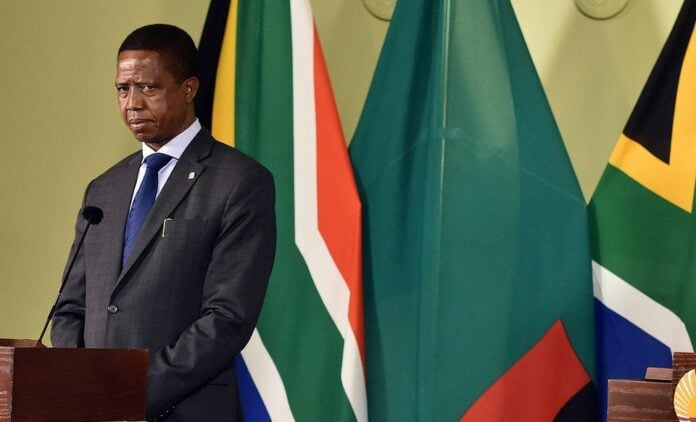Opinion: Lungu Burial Saga Exposes Zambia’s Legal Vacuum
By Oliver Jangulo
The Pretoria High Court’s handling of the Edgar Lungu dispute has stripped bare an uncomfortable truth: Zambia has no law that regulates the burial of former presidents. We are witnessing not simply a family-versus-state quarrel, but a constitutional void that risks repeating itself with every presidential death.
Advocate Tembeka Ngcukaitobi’s argument — that “you cannot reinstate rights on a corpse” — spoke directly to the limits of the Benefits of Former Presidents Act. That Act governs pensions and allowances, not funerals. Edgar Lungu lost his benefits the moment he returned to politics in 2023. On this, there is little debate.
The government has shifted its weight to presidential immunity, claiming it provides the basis for state control over funeral arrangements. Yet immunity is no safe harbour: it can be stripped by Parliament, and many in Lusaka believed Lungu was already on the verge of losing it. To rest the government’s claim on immunity alone is therefore a fragile strategy.
The Pretoria court adds another twist: Zambian statutes do not apply in South Africa. Judges there are instead guided by international principles of dignity and comity. That is why earlier they sided with the government’s request for repatriation, but yesterday’s session showed just how uncertain that reasoning remains.
Other countries have faced similar dilemmas, but some have handled them better. Tanzania has a clear statute that respects both state ceremony and family wishes. Zimbabwe has no such law, and the chaos around Robert Mugabe’s burial in 2019 was the result. South Africa, in Mandela’s case, struck a balance by granting the family the final burial choice while still giving the nation its full state funeral.
Zambia, by contrast, continues to stumble forward without codification. Kenneth Kaunda’s family backed away from litigation in 2021; otherwise, the courts might have faced the same quagmire we now see with Lungu.
And that is the lesson. Whichever way the Pretoria bench rules, one side will feel robbed the government of its protocol, or the family of its rights as kin. A judgment may settle the immediate matter but not the underlying problem. The best solution lies in compromise and reform. Out-of-court dialogue could both preserve Embassy Park’s dignity and acknowledge the family’s claim. And in the longer term, Parliament must legislate clear rules, so no future president’s funeral becomes a courtroom drama.
This saga is not only about Edgar Lungu. It is about how Zambia chooses to honour the presidency itself with clarity, respect, and law, not uncertainty and strife.



It actually exposes HH’s hate and legal vacuum in his administration.
Good reply This will come to light in 2026 for sure
The president doesn’t make laws , thats the work of Zambian parliament ,
The Lungu family, on what basis point is it important to bury ECL in South Africa? I don’t think if there’s any. This just shows that something big behind the scene is a big fish.
Again and as usual this guy called Nkana is missing the point as always, the Lungu family has always wanted to bury ECL in Zambia. The reason why the repatriation process was in full gear when HH abrogated the agreed terms. Therefore the family is trying to bury in South Africa as a plan B and not that they desire so. Always important to follow mutu wa nkhani
The Lungu Family may have their rights, but keeping the body for so long shows a lack of love and respect for the deceased. Who truly heard that President HH’s statement about attending the funeral? The Man has been Quiet. Ester Lungu’s actions suggest cruelty and a lack of love for her husband.
There is no need for anything legal or regulatory for funerals of Presidents or former Presidents. These people are not demigods but just mere mortals like all of us in the eyes of God. On any day, any funeral is the exclusive business of the family whether the deceased is an ordinary person or former President. There is absolutely no law in Zambia giving the state any powers over the family – FACT
Lungu is hiding somewhere in southern africa
Better understand the legal concepts and proceeding. What was there and expected in that court was just the justification for application for the leave of appeal of the judgement to a higher court. In the actual legal practice, the hired Rastafarian Lawyer found it very thick and difficult to justify the appeal application. He really fumbled and abandoned the context of the judgement and started just talking about his own opinions and wishes of future legal items to be included in constitutions. Otherwise the government has not exposed itself as ignorantly stated by some. Instead, it’s the lungu family that has told and exposed how sinful, unforgiving, unreconciliative lungu was to he happened to hate. The family has continued to tell the earth and the heavens that lungu died with such a hatred against some people, that even in coffin, he is rotting with great deadly and sinful hatred against some people. Instead talking good things about him they have continued telling the world that his spirit doesn’t and shall not allow those he had hated to be anywhere near his coffin or burial place.
Zambian law evolves through acts of parliament and court precedent. It’s thus wrong of Advocate Tembeka Ngcukaitobi to argue that there is no law for burial of presidents in Zambia because the KK happenings set a precedent that now applies as law in Zambia. Lungu himself argued as such against the Kaunda family’s quest to bury him next to him wife’s grave at their residence, but entomb him at the Embassy Park. Now the mambala’s family want to run away from a precedent he himself set up.